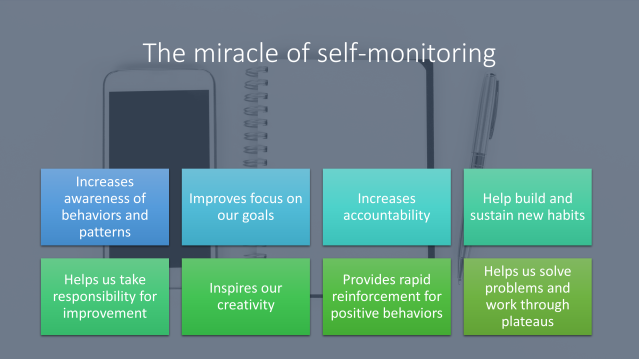Habit Formation
Keeping Score: Why Tracking Progress Fuels Success
Want to level up in life? Then start tracking what you want to improve.
Posted August 9, 2023 Reviewed by Ray Parker
Key points
- Tracking progress is among the simplest and most effective tools for improving your results.
- Tracking can be adapted to nearly any goal and implemented in many formats.
- Emotional factors impede many people from using tracking methods and enjoying the rewards they offer.
I want to start this post with an apology because I know you've heard some version of this sales pitch before: Do you want to be happier? Healthier? Lose those love handles? Become wealthier? More successful in your career? Or enjoy a life filled with growth, contribution, and purpose? If so, read on.
In an internet space filled with improvement hacks and self-help solutions, I want to tell you about something that really works. Not just in my opinion or even my professional experience. Not in exchange for your credit card number. And not for a limited time only.
Instead, I want to tell you about something that worked a thousand years ago and that works just as well today. A time and science-proven strategy that can spark remarkable progress in any area of your life; personal, professional, or relational. The cost of this life-changing formula is zero to minimal. The effort involves just a few minutes of your time and attention each day.
If this sounds too good to be true—and I realize it probably does—you may be surprised to learn that the single most effective strategy for self-improvement is also the oldest, cheapest, and simplest.1-4
What is this miraculous success strategy? Just this: Track the thing you want to improve.

The Miracle of Self-Monitoring
Let's be honest: Tracking your goals, behaviors, and outcomes is undoubtedly the most boring self-improvement hack ever. It is neither sexy, novel, nor profitable to promote. But it works. For virtually anyone and virtually any goal. Some examples:
- Speak to a financial advisor and they will have you track your income and expenses.
- Speak to a nutritionist and they will have you track your food intake.
- Speak to a personal trainer and they will have you track your workouts.
- Speak to a physician, a psychologist, a professor, or a scientist and you'll keep seeing variations of the same strategy: To treat, to progress, to learn, to recognize patterns, find solutions, and overcome plateaus you can either chase random strategies and popular trends on social media or you can apply what the fittest, healthiest, most skilled and successful people already do: Track what you want to improve.
Tracking has many synonyms. Self-monitoring, diaries, logs, journals, and planners are just some of the most common. The truth is the name you give it doesn't matter.
What does matter are the abilities and inner potential that tracking reliably unlocks in your brain (see the above photo). Tracking is an external behavior that unleashes our internal strengths. We become more aware, more focused, more reliable, more creative, and more motivated.
Needless to say, this is a powerful combination of abilities, one that allows you to bring multiple strengths and resources to make progress in nearly any area of your life.
Why Most People Don't Track Their Progress
The overwhelming scientific and anecdotal evidence supporting the power of tracking raises the obvious question: Why isn't everybody tracking their progress? Turns out that it isn't time and it isn't cost; the barriers are emotional. Here are the main ones:
1. We all know that simply tracking something doesn't magically burn calories, build muscles, foster love, or produce wealth. For this reason, tracking what we want to improve doesn't feel intuitive. In fact, it probably feels like a waste of time.
Our conscious minds pridefully tell us that we already know what we want, what we ate, how much we exercised, and how we spent our weekends and money. So, what's the point of writing it down? And if our minds were accurate, there indeed wouldn't be much benefit in tracking.
Yet the power of tracking for improving our lives arises precisely because our minds are riddled with limitations and excessively reliant on heuristics. We are distractible, forgetful, short-sighted, and easily influenced by external factors. This makes even the best-intentioned person more likely to go in circles than to make forward progress.
Tracking works because it activates your brilliant unconscious abilities instead of relying on your flawed conscious mind.
2. You've heard the expression that the truth hurts. Nietzche wrote: "Sometimes people don't want to hear the truth because they don't want their illusions destroyed." He couldn't have been more accurate when it comes to tracking.
Tracking is a tough love friend, the kind that tells us the truths we don't want to hear. The uncomfortable reckoning we're forced to confront when we track ourselves is the other major emotional barrier for most people in implementing this remarkable self-improvement strategy.
If this is a barrier for you, think about this discomfort from the perspectives of the advantages and disadvantages. There may well be some initial emotional pain from looking at yourself objectively, for example, balanced by the knowledge and opportunity tracking will reveal for you to make real and lasting progress. Is the short-term pain worth the long-term gain?
Keeping Score
- Imagine a quarterback playing football without the ability to know the score, the down, or where the team is on the field.
- Imagine a baseball player at the plate who isn't allowed to know the inning, the pitch count, or if anyone is on base.
- Imagine a soccer player trying to score while wearing a blindfold; unaware of where they are on the field or the location of the goal.
As absurd as the above scenarios may seem, consider that this is exactly how many people are trying to navigate the world. On the one hand, they probably have many areas of their life they would like to improve. Yet they have no objective information about where they are in relation to their goals, whether they are progressing or regressing, or what is causing their results. If you were throwing darts in the dark before, tracking works because it allows you to finally turn on the light and see your target.
In short, tracking is the way that we keep score. Not for a game of baseball or Monopoly but for the much higher stakes in the Game of Life.
Summary
Track what you want to improve. Make this phrase a mantra if you want a better life. And if you want to become one of those rare people who live to their full potential, make it a daily practice.
References
1. Schnell O, Alawi H, Battelino T, Ceriello A, Diem P, Felton AM, Grzeszczak W, Harno K, Kempler P, Satman I, Vergès B. Self-monitoring of blood glucose in type 2 diabetes: recent studies. J Diabetes Sci Technol. 2013 Mar 1;7(2):478-88. doi: 10.1177/193229681300700225.
2. Compernolle, S., DeSmet, A., Poppe, L. et al. Effectiveness of interventions using self-monitoring to reduce sedentary behavior in adults: a systematic review and meta-analysis. Int J Behav Nutr Phys Act 16, 63 (2019). https://doi.org/10.1186/s12966-019-0824-3
3. Burke LE, Wang J, Sevick MA. Self-monitoring in weight loss: a systematic review of the literature. J Am Diet Assoc. 2011 Jan;111(1):92-102. doi: 10.1016/j.jada.2010.10.008.
4. Mooney, P., Ryan, J.B., Uhing, B.M. et al. A Review of Self-Management Interventions Targeting Academic Outcomes for Students with Emotional and Behavioral Disorders. J Behav Educ 14, 203–221 (2005). https://doi.org/10.1007/s10864-005-6298-1.




